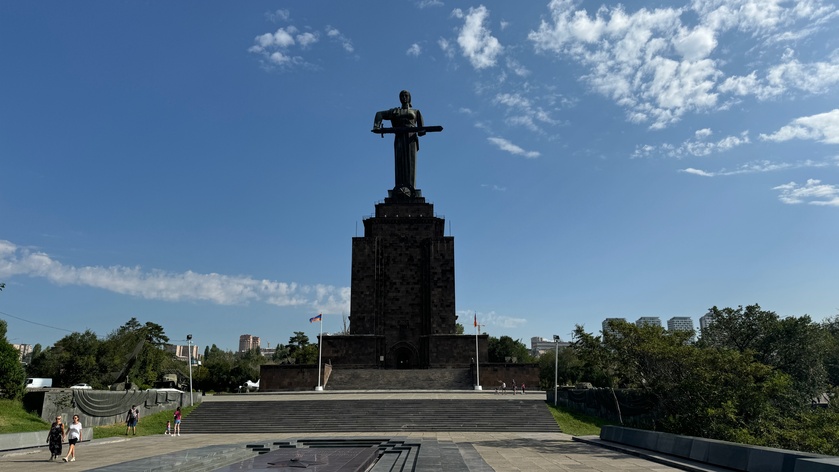While most Americans haven't paid much attention to the South Caucasus, a quiet but bitter diplomatic controversy is brewing there—one that’s putting Israel’s foreign policy under an uncomfortable spotlight.
You might assume Israel would naturally side with Armenia: a Christian-majority country that suffered genocide in the 20th century and faces constant threats from larger, more aggressive neighbors. Sounds familiar, right?
Instead, Israel has chosen to deepen its strategic alliance with Azerbaijan, a wealthy authoritarian regime with close ties to Turkey and a long history of aggression toward Armenia. For Armenians—in Israel, in the homeland, and across the global diaspora—this feels like betrayal. And they’re not staying quiet about it.
Here’s why this alliance exists, and why it’s deeply troubling to many.
Oil, Drones, and Iran: The Geopolitical Calculus
Let’s start with the basics: Azerbaijan gives Israel three things Armenia can’t.
1. Oil
Roughly 40 percent of Israel’s oil comes from Azerbaijan. That’s not a detail—it’s a lifeline. A stable, overland energy route from the Caspian Sea to Israel via Turkey is critical to keeping the lights on in Tel Aviv.
2. Eyes on Iran
Azerbaijan shares a 428-mile border with Iran. That proximity makes it a prime staging ground for Israeli intelligence operations.
Multiple sources have confirmed that Israel operates surveillance drones, early warning radar, and possibly even special operations units from inside Azerbaijan—tracking Iranian missile sites, nuclear facilities, and IRGC movements in real time.
3. A Lucrative Arms Market
Israel is Azerbaijan’s second-largest arms supplier. In the 2020 Nagorno-Karabakh war, Israeli-made Harop suicide drones and Hermes surveillance aircraft helped Azerbaijan crush Armenian positions with devastating precision.
Arms sales to Baku total billions of dollars—and help fund Israel’s own defense research and development.
So while Armenia shares historical and cultural similarities with Israel, Azerbaijan offers cold, hard strategic value.
A Moral Contradiction
That’s the calculation in Jerusalem. But in Yerevan—and in the hearts of Armenians around the world—it’s seen very differently.
Armenia was the first nation to adopt Christianity, and has sheltered Jews for centuries without a history of antisemitism.
120,000 ethnic Armenians were forcibly displaced from Nagorno-Karabakh in 2023–24 in what many observers—including genocide scholars—called ethnic cleansing.
Despite this, Israel continued to arm Azerbaijan even as international human rights organizations sounded the alarm.
To add insult to injury, Israel still hasn’t formally recognized the Armenian Genocide, largely due to pressure from Turkey and Azerbaijan.
This has fueled growing anger—especially in the Armenian Quarter of Jerusalem, where tensions between locals and nationalist Jewish settlers have escalated in recent years. Armenian clergy have reported being spat on, their property vandalized, and their historic land threatened by government-backed development deals.
In short: the world’s only Jewish state is cozying up to a regime accused of wiping out an ancient Christian population—and Armenian Christians are watching in disbelief.
Is Change Possible?
Some voices in Israel are calling for a shift.
Prominent Jewish academics, Christian leaders, and members of the Knesset have urged the government to recognize the Armenian Genocide.
Western support for Armenia is growing, especially as it seeks stronger ties with the EU and NATO.
Azerbaijan’s increasing authoritarianism—and its alignment with Iran when convenient—may eventually force Israel to reevaluate.
But for now, realpolitik rules. And the message from Jerusalem is clear: strategic interests trump moral alignment.
Why Americans Should Care
This story matters far beyond the Caucasus. It’s a case study in the hard choices small nations make to survive. But it also raises uncomfortable questions for anyone who values human rights:
Should the U.S. and Israel continue to arm regimes that ethnically cleanse civilians?
How do we balance strategic alliances with moral leadership?
And when Christians in the Middle East cry out for help, who will stand with them?
Americans—especially Christians who support Israel—should take a closer look at what’s happening in Armenia. This isn’t just about oil, or Iran, or drones.
It’s about justice.
And justice should never be optional.

















